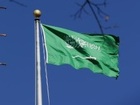In a desolate area of Syria where Lebanese militant group Hezbollah once held sway, security forces shot open the gates to an abandoned building and found a defunct drug factory.
Syria's new authorities launched a security campaign last week around Qusayr at the porous Lebanese border, cracking down on drug and weapons smugglers.
 Full Story
Full Story
U.S. President Donald Trump's plan to take over Gaza will imperil attempts to forge landmark ties between Saudi Arabia and Israel and fuel anti-American sentiment in the oil-rich kingdom, analysts said.
Trump's proposal to redevelop Gaza and oust the more than two million Palestinians living in the territory prompted a global backlash and enraged the Arab world, making it difficult for the Saudis to consider normalisation.
 Full Story
Full Story
Gaza has long been a powder keg, and it exploded after Hamas fighters stormed southern Israel on Oct. 7, 2023, killing and abducting people, which sparked a crushing Israeli military operation that's only recently stopped under a tenuous ceasefire.
U.S. President Donald Trump's suggestion Tuesday that displaced Palestinians in Gaza be permanently resettled outside the war-torn territory and the U.S. take "ownership" of the land is triggering new tensions over the future of the enclave.
 Full Story
Full Story
Palestinians will mark this year the 77th anniversary of their mass expulsion from what is now Israel, an event that is at the core of their national struggle.
But in many ways, that experience pales in comparison to the calamity now faced in the Gaza Strip — particularly as President Donald Trump has suggested that displaced Palestinians in Gaza be permanently resettled outside the war-torn territory and that the United States take "ownership" of the enclave.
 Full Story
Full Story
U.S. President Donald Trump's stunning proposal to forcibly transfer hundreds of thousands of Palestinians out of the Gaza Strip and develop it as a tourist destination faces major obstacles.
The Palestinians and many others view such plans as ethnic cleansing, an attempt to drive them from their homeland after Israel's 15-month offensive against Hamas rendered much of it uninhabitable. It was also seen as an attempt to liquidate their decades-long struggle for a state, which has wide international support.
 Full Story
Full Story
They walked for hours loaded with whatever clothes, food and blankets they could carry. Many smiled, some hugged loved ones they hadn't seen for months. Hundreds of thousands of Palestinians filled Gaza's main coastal road as they streamed back to homes in the north.
The mood was joyous, even though many knew their homes had been destroyed in Israeli offensives against Hamas that leveled large parts of Gaza City and the surrounding north.
 Full Story
Full Story
U.S. President Donald Trump's suggestion that Egypt and Jordan take in Palestinians from the war-ravaged Gaza Strip was met with a hard "no" Sunday from the two U.S. allies along with the Palestinians themselves, who fear Israel would never allow them to return.
Trump floated the idea on Saturday, saying he would urge the leaders of the two Arab countries to take in Gaza's now largely homeless population, so that "we just clean out that whole thing." He added that resettling most of Gaza's population of 2.3 million could be temporary or long term.
 Full Story
Full Story
When Dania Hanatsheh was released from an Israeli jail this week and dropped off by bus into a sea of jubilant Palestinians in Ramallah, it was an uncomfortable déjà vu.
After nearly five months of detention, it was the second time the 22-year-old woman had been freed as part of a deal between Israel and Hamas to pause the war in Gaza.
 Full Story
Full Story
Israeli Prime Minister Benjamin Netanyahu should be flying high.
Israel's enemies across the region have been badly weakened during 15 months of war. Israeli hostages have begun to come home from captivity in Gaza, and Netanyahu's good friend, Donald Trump, is back in the White House.
 Full Story
Full Story
Inside a lavish clubhouse on Doha's waterfront, tensions strained by months of fruitless back-and-forth weighed on negotiators as the hour neared 3 a.m.
On the first floor, a Hamas delegation whose leader had once evaded an Israeli airstrike that killed seven family members combed through the details of yet another proposal to halt the war in Gaza. On the second floor, advisers to Israel's intelligence chief, who had vowed to hunt down those responsible for the Oct. 7, 2023, attack that ignited the war, did the same.
 Full Story
Full Story



